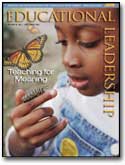September 1, 2004
•
5 min (est.)•
Vol. 62•
No. 1All About Accountability / Why Assessment Illiteracy Is Professional Suicide
To give our readers practical insights into accountability and assessment, we invited W. James Popham to write this monthly column for Educational Leadership. Popham is the author of 25 books, including The Truth About Testing (ASCD, 2001) and Test Better, Teach Better (ASCD, 2003). In addition, he is a former test developer and an outspoken critic of poorly designed and badly used tests. Popham will address such topics as adequate yearly progress, teaching to the test, and using assessment for diagnostic purposes. We welcome your comments at<LINK URL="mailto:el@ascd.org">el@ascd.org</LINK>.

Assessment literacy now ranks as one of our field's most fashionable phrases. Indeed, you can hardly attend any accountability conference these days without hearing someone extol the virtues of being knowledgeable about assessment. The reason for such advocacy is simple: Educational accountability and assessment literacy are almost joined at the hip—or should be. Let me explain why.
When members of any profession are required to demonstrate that they're performing satisfactorily, we refer to this process as accountability. Of course, members of a profession rarely install an accountability system volitionally. Rather, accountability systems are imposed from outside because the public has doubts about that profession's quality of service.
Once issued, demands for accountability rarely disappear. Public skepticism, it seems, has a remarkably long shelf life. So those of us in education must recognize that accountability will be with us for a long time. Given this reality, our challenge is to cope with externally imposed accountability requirements in a way that best benefits our students.
Although professionals are judged on a number of factors, one particularly important evaluative criterion usually ends up being the linchpin of a given profession's accountability system. For example, to judge a heart surgeon's success, we might chart patient survival rates. Similarly, we might evaluate judges according to the percentage of their rulings that higher courts uphold.
In education, the linchpin of the accountability system is our students' test performance. Astonishingly, however, when it comes to this key indicator of education quality, the vast majority of educators reside in blissful ignorance. Such assessment illiteracy is surely a prescription for professional suicide.
Most of today's public school educators were never required, as part of their preservice or inservice training, to dig meaningfully into the viscera of educational testing. Oh, perhaps one of their instructional methods courses included a one-week dip into classroom assessment and the mysteries of multiple-choice items. But educators' serious confrontations with accountability-related assessment are almost as rare as their encounters with extraterrestrial parents during back-to-school night.
A second reason for educators' unfamiliarity with testing is that many of them regard assessment as a complex, quantitative arena well beyond the comprehension of mere mortals. That excuse, however, simply doesn't wash. What teachers and administrators need to know about testing, at least for purposes of educational accountability, relies on common sense more than statistical exotica. In fact, the entirety of what today's educators need to know about accountability-related testing is readily understandable without learning even a single formula.
Not all tests used for accountability are flawed. In fact, suitable accountability tests can provide educators with a legitimate opportunity to display their effectiveness. But educators need to become sufficiently assessment literate so they can understand and, if necessary, help improve any accountability system that relies on unsuitable achievement tests. Happily, it really doesn't take much time to acquire the necessary level of accountability-related assessment literacy.
How can educators become more assessment literate, particularly given the considerable time crunches they face? The answer is not to sit down and read an educational measurement textbook from cover to cover. Most traditional textbooks were written for graduate students aspiring to be assessment specialists; their content is not useful for real-world educators.
Another ill-conceived strategy for boosting one's assessment literacy is to solicit electronic succor from the Internet. When I last looked, a Google search for educational assessment yielded about 5 million entries. Who has time to dig out any wheat from all that chaff?
The most practical solution is to locate one or two assessment books written specifically for in-the-trenches educators. Then, as part of a collegial study group (because it helps to have allies in this quest), devote a dozen or so hours to acquiring a reasonable amount of assessment literacy. That's really all the time it will take!
The most suitable books for your study will depend on the specific needs and interests of your group. With arguable objectivity, I can recommend books that I recently wrote for ASCD, but a number of other first-rate assessment books are also available. To explore your options, you might want to split up the task so that different study group members sample different books for a chapter or two; then pick the book that makes the most sense. If you're tackling this task solo, choose a book that you personally find engaging. And, of course, read this column every month—slowly.
In most religions, suicide is regarded as a significant sin. In the field of education, professional suicide is no less sinful.
